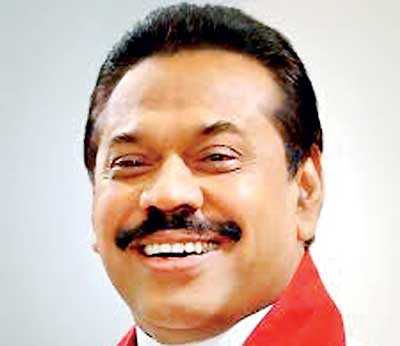Tuesday Feb 24, 2026
Tuesday Feb 24, 2026
Tuesday, 3 July 2018 00:00 - - {{hitsCtrl.values.hits}}
Weak response of Government
The story in the New York Times about Mahinda Rajapaksa having got millions of dollars as election money off the China Harbour Company account offers the Yahapalanaya Government and the broad civil support movement for good governance a wonderful opportunity to torpedo forever the febrile campaign of the Rajapaksas to return to power ever since the family lost in 2015. This campaign we call ‘Mahinda Sulanaga’ because that is what the organisers wanted it to be. The weak response from the Government is unbelievable!
It is so surprising that one wonders whether the Government is either secretly backing the former dictator for reasons best known to it. It also may be that key persons in this Government are also having dirt soil on their hands that have to be covered up. Silence in response is sometimes a good strategy; but not when a glorious political opportunity is missed thereby.
Mahinda defenders pummel the messenger
On the other hand, we have had many backers of the Rajapaksa regime like former Central Bank Governor Nivard Cabral and Viyathmaga organiser Dr. Nalaka Godahewa swiftly slaying the messenger. The latter want us to believe that the New York Times is a ragtag publication (kele paththare). Please Google ‘New York Times’ and this is what you will find:
“The New York Times is an American newspaper based in New York City with worldwide influence and readership. Founded in 1851, the paper has won 125 Pulitzer Prizes, more than any other newspaper. The New York Times is ranked 17th in the world by circulation.”
An impressive achievement isn’t it? And a great-looking bit of investigative journalism by that team has given us this story, which is full of specific facts, allegations and verifiable evidence. The story claims to have copies of transactions that the Chartered Bank had over the transfer of dollars deposited by cheque to this bank. The story also says that Mahinda had given a portion of that money to a prominent Bhikkhu in order to round up the respected Sangha for the campaign.
Mahinda Rajapaksa’s statement
In a statement issued by Mahinda, the former President denies the charge of having got 7.3 million dollars from the China Harbour Company for his election campaign. Although it is his job to deny, it is the task of this Government to have this seriously investigated. The onus is now in the hands of President Sirisena to use his famed sword.
Mahinda makes a number of illogical assertions in this statement. He states that the fact that the Prime Minister has accepted giving the Port City Project back to the China Harbour Company proves that that company is cleared of charges like this.
Worse still, Mahinda also goes on to defend the Hambantota Project in a preposterous manner: “There was never any problem about meeting the payments for the Hambantota Port because it was paid out of the profits of the Sri Lanka Ports Authority (SLPA). The Auditor General’s report for 2014 states that the profit of the SLPA in 2014 after paying all loans and taxes was Rs. 8.8 billion.” What logic is that? To pay Peter we rob Paul. Hence, no problem in paying the port dues!
Serious implications
For three distinct reasons this China story is too serious to be ignored by the Government. In the first place, if it is correct, the suspicions become credible about Mahinda Rajapaksa having been hand-in-glove with Chinese firms in order to earn illicit money for favours over a range of projects.
A China loan given this way carries a precondition that the recipient country must give the job to Beijing’s preferred Chinese Company. Such a precondition also creates a special close nexus with political leaders in the recipient countries and the Beijing parties. No tenders to be called for. Hence, plenty of room for politicians to build in commissions into the award. Another condition is that construction work is to be executed by Chinese labour – thus denying any flow-on employment benefits to the recipient country’s labour. The practice is thus ridden with holes.
It is said that China’s method of subjugation is to give loans for any project without scrutiny. When it comes to payback time, Beijing plays hardball and ends up owning a portion of the country’s land or owning special rights to facilities.
An ABC documentary I saw recently in Australia, detailed this alleged game plan of China now going on in the Pacific island of Vanuvatu. The New York Times story refers to a diplomat called Rodrigo who stated that in the case of the Hambantota Project one of the guarantees that Beijing extracted out of our Government was that we promise to let China know who comes into the port and who goes out.
(The writer can be reached via [email protected].)
Foreign influence?
In the second place, the story if proven shows that a foreign power has influenced our local politics in order to get a result they want. This is serious, too. In that event, Mahinda Rajapaksa has bartered away our country, encouraging foreign interference for his personal gain much like the then reigning kings of Sri Lanka who compromised with invading foreign powers. Mahinda’s self-claimed nationalism then becomes a hoax.
In today’s context, politicians and political parties do need a lot of funds to fight an election. This must be admitted. In Australia, the Government reimburses election costs to some extent on a computation formula that is based on the number of votes obtained by the recipients. On the other hand, there are laws in Australia that require the declaration of sources of electoral funding and their deployment. In the case of foreign fund flows, the law requires that they be declared immediately.
It is urgent that the Government of Sri Lanka bring in similar legislation.
Sullying our Sangha?
Thirdly, the specific allegation about giving millions to a high profile Buddhist monk for rounding up other monks needs digging in, too. If this be true, then Mahinda Rajapaksa’s perceived image of being a “true Buddhist leader,” is dashed to the ground as a hopeless illusion. In the same manner and conversely, the current deterioration of the once glorious Sangha and Sasana becomes evident and something needs urgently to be done in order to reinstate that image.
(The writer can be reached via [email protected].)